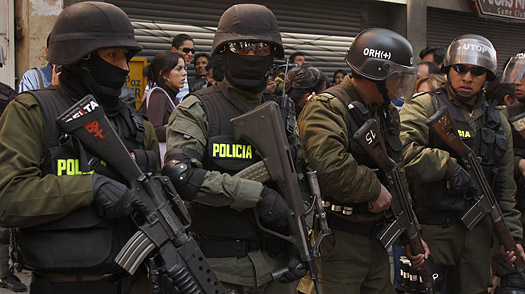
(above) Bolivian police officers stand guard in front of a Judiciary Police station where suspects of an alleged plot against President Evo Morales are held under custody in La Paz, Thursday, April 16, 2009. (Photo: Juan Karita / AP)
A Plot to Kill Bolivia's Leftist President?
April 16, 2009 - Time Magazine
By Jean Friedman-Rudovsky / La Paz and Tim Padgett
Bolivia had been enjoying some well earned quiet in recent days. South America's poorest nation seemed on the verge of a civil war last year between forces loyal to President Evo Morales, Bolivia's first indigenous head of state, and those aligned with the country's white elite. But after a new Constitution was finally approved in January, and an agreement was struck earlier this week to hold new presidential and congressional elections, calm seemed at hand.
It was shattered before dawn on Thursday when authorities uncovered what they insist was an assassination plot against Morales. At 4:30 a.m., police surrounded the Hotel de las Americas in downtown Santa Cruz, the capital of Bolivia's anti-Morales east. They'd been tipped about armed occupants in two of the rooms; and when they went to check it out, say government officials, they were met with gunfire. They returned it and killed three of the five men in the rooms, wounding the other two. According to Vice President Alvaro Garcia Linera, authorities were then led to Santa Cruz's convention grounds, where they found an arsenal of sharp-shooter rifles, grenades, C-4 explosives and other heavy weaponry. (Is Bolivia's President Evo Morales one of the most influential people in the world? Vote for the TIME 100.)
More important, Garcia said, they also discovered maps and documents showing that the group the men in the hotel allegedly belonged to had been stalking the caravans of high-ranking government officials and plotting assassination attempts. Vice Minister of the Interior Marcos Farfan said the documents indicated that two members of the group were present when Morales handed out land titles to indigenous Guarani in Santa Cruz province last month — and that they'd supposedly abandoned a scheme to plant a bomb at a recent Morales recent cabinet meeting near Lake Titicaca. More ominously, said Garcia, "we also found documents that speak of future preliminary preparations for an assassination of the President and Vice President." (Check out a story about Bolivia's immense and strategic natural resources.)
As he stepped off a plane in Venezuela later in the day, where he was meeting with Venezuelan President Hugo Chavez before traveling on to the Summit of the Americas in Trinidad on Friday, Morales said unequivocally, "They were going to kill me." He added, "These are international mercenaries" aligned with Bolivia's right-wing opposition. Whether or not the men are linked to the conservative opposition — whose members adamantly denied any ties — officials say a flag of the Nacion Camba — a Santa Cruz-based fascist group — was reportedly found among the weapons. According to security officials, one of the three men killed at the hotel was alleged to be a Romanian; one was from Ireland. One of the wounded, say officials, is a former member of the Bolivian military who trained in Croatia. Eastern Bolivia is home to a politically conservative Croat enclave that has been ardently opposed to Morales and his pro-indigenous government since he was elected in 2005.
One link Morales didn't make Thursday was to the U.S., which he has long insisted is out to destabilize his government because of his left-wing, anti-Washington agenda (including his nationalization of Bolivia's vast natural gas reserves) as well as his alliance with fellow Latin radicals like Chavez and Cuban President Raul Castro. Last year, in fact, Morales expelled the U.S. ambassador after accusing him of supporting his right-wing foes in Santa Cruz. Last week, he remarked that armed groups in that province were "instruments of the empire," his code for the U.S. But while he complained on Thursday of "outside interference" in Bolivian affairs, he pulled back from fingering Washington, saying he didn't yet know who was financing the alleged assassination plots. Said Garcia, "It's now the work of the [Bolivian] Attorney General to figure out who's behind these operations."
Though paramilitary groups are common inside South American neighbors like Peru and Colombia, they are not in Bolivia. Opposition leader and Santa Cruz Prefect Ruben Costas suggested Thursday's events might be a government stunt orchestrated by Morales, who has declared assassination plots against him on several occasions during his presidency but had yet to offer proof. "Anyone can see that this is a crude staging, a show," Costas said in a press conference, adding it could also be the government's way of deflecting attention away from a bomb that exploded outside the Santa Cruz house of a Roman Catholic Bishop, Julio Terrazas, who is a vocal critics of Morales. Costas and the opposition claim that pro-government forces planted that explosive.
The opposition insists Morales wants to create an authoritarian socialist state in Bolivia. At the same time, anti-indigenous racism is widespread in Bolivia's east. Right-wing opposition groups were responsible for violent attacks on indigenous citizens last year before January's constitutional referendum, which gave Bolivia's majority indigenous more political power but had many worried that Santa Cruz and other resource-rich eastern provinces might try to secede from the poorer highlands, where the capital, La Paz, is located. Morales himself went on a five-day hunger strike last week to get Bolivia's Congress to pass an electoral law that gives the indigenous more legislative seats.
Morales' foes say the measure simply gives him a larger advantage in the presidential election slated for December. But if Morales really can build a legitimate case that his political opponents were behind the "mercenaries" at the Hotel de las Americas, they'll have even bigger campaign problems to worry about.